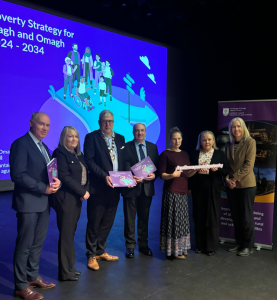NI Anti-Poverty Strategy
There has been an unacceptably long wait for an Anti-Poverty Strategy from the NI Assembly. Currently, there still is not a strategy.
Legal Obligation
Following the 2006 St Andrews Agreement, a legal duty was introduced on the NI Executive under s28E of the Northern Ireland Act 1998 (as inserted by s16 of the Northern Ireland (St Andrews Agreement) Act 2006). This duty reads as follows:
- The Executive Committee shall adopt a strategy setting out how it proposes to tackle poverty, social exclusion and patterns of deprivation based on objective need.
- The Executive Committee –a) must keep under review the strategy; and b) may from time to time adopt a new strategy or revise the strategy.
Judicial Review
In 2015 the Committee on the Administration of Justice (CAJ) took a judicial review against the Executive for the failure of implementing an anti-poverty strategy based on objective need.
Judge Treacy of the high court ruled in favour of CAJ.
His judgement set out that, “A strategy is intended to guide, to set a course. It must therefore be implicit in the idea of a strategy that that strategy must be identifiable, it must be complete, it must have a start, a middle and an end, it must aim to be effective, its effectiveness must be capable of measurement and the actions which are taken in attempting to implement that strategy must be referable back to that overarching strategy.”
And he found that “While it is clear that there are many current programmes and interventions which in fact deal with the same issues that section 28E seeks to address, that section creates a duty to have an overarching strategy, and it is this long range plan which doesn’t exist and is incapable of being made to exist by the combination of programmes and interventions.”
He went on to discuss objective need.
The applicant [CAJ] correctly identified section 28E as an important milestone in the development of equality law in NI because the concept of ”objective need” had for the first time been put on a statutory footing. This provision was to provide the Executive Committee’s strategy for tackling poverty, social exclusion and patterns of deprivation. The concept of ”objective need” is obviously central to the statutory provision the intention of which is to remove or reduce the scope for discrimination by tying the allocation of resources to neutral criteria that measure deprivation irrespective of community background or other affiliation.
Judge Treacy, NIQB 59
New Decade, New Approach
In January 2020, the New Decade, New Approach agreement for restoring the NI Assembly recommitted to “Delivering a fair and compassionate society that supports working families and the most vulnerable. The Executive will develop and implement an Anti-poverty Strategy.”
Expert Advisory Panel
To that end, the Department for Communities commissioned an Expert Advisory Panel to make recommendations for an Anti-Poverty Strategy, which was published in December 2020. The report can be downloaded below.
The Panel’s key assumption is that the purpose of an APS is to living costs for those below an agreed, objectively-defined poverty line. This is a departure from past policies which have tended to be indistinguishable from compensatory or preventive social inclusion interventions, for example, around health, education and neighbourhoods. These wider policies sit within other outcome-based strategies which collectively address social exclusion and patterns of socio-economic deprivation, all of which are interlinked in creating a fairer more equitable, cohesive and prosperous society.
Our primary recommendations are aimed at directly raising disposable household income. But we also include secondary proposals which enable people to work more and raise living standards. The most important example is childcare which is integral to reducing child poverty.
There is a long tradition in NI of geographically-based multiple deprivation measures and policies. There is an equally long research tradition as to the effectiveness of policies designed to combat poverty through area-based interventions. Our focus on households and categories of people, rather than on socio-economically deprived areas, is a deliberate one. It is based on the common observation that the majority of children living in poverty do not live in the most deprived areas – an area-based approach to poverty fails to cover most of the households wit incomes below the poverty line. This is not an argument against area-based policies as such, but initiatives of this type can only be regarded as anti-poverty policies if they contribute directly to raising household incomes through access to more and better-paid work, and to unclaimed benefits, and by reducing the costs of household essentials.
Expert Panel: Goretti Horgan, Pauline Leeson, Bernadette McAliskey and Mike Tomlinson
Co-Design Group
Subsequently, the Department for Communities convened an Anti-Poverty Strategy co-design group to advise the Department on the drafting of the anti-poverty strategy. This group was convened by then Minister Deirdre Hargey, but the process was cut short by the collapse of the Stormont Assembly in 2022. Some members of the c-design group decided to publish their draft recommendations to put their work on record, as the future of the Department’s strategy development was unclear. The recommendation paper can be downloaded below.
The co-design group ambitiously set its aim on eradicating poverty in Northern Ireland by 2040, and recommended that the Anti-Poverty Strategy commit to the following outcomes:
Outcome 1
The creation of an Anti-Poverty Act which will ensure that the rights of people experiencing or at risk of poverty are promoted, protected, and realised.
Outcome 2
Working towards eradication by 2040, child poverty will be reduced by half over the lifetime of this Strategy.
Outcome 3
No working age person shall live in poverty, regardless of whether they are in work, seeking work or unable to work. All those of working age will have sufficient income to participate fully in society and can access services and pathways to sustained and meaningful employment.
Outcome 4
No older person shall be in poverty: Rates of poverty among older people should be reduced by 30%, or more if poverty levels rise, working towards eradication within the lifetime of the Strategy. Older people experiencing or at risk of poverty will have adequate income and support in relation to their economic, physical, and mental wellbeing to ensure their equal participation in society.
Outcome 5
We have attractive, safe, accessible, welcoming, and sustainable environments in the most deprived areas.
Outcome 6
All people experiencing or at risk of poverty have equal access to high quality public services that meet their needs in a timely manner and are based on dignity, fairness, and respect.
Maintaining Pressure
To continue the pressure on the Department for Communities, the Equality Coalition, NIAPN, and Barnardo’s NI held a seminar in Stormont on 28 June 2023. The goal of the seminar was to urge the Department for Communities and the Assembly to commit to making the Anti-Poverty Strategy a day one priority for an incoming Executive. The seminar brought together the expertise of those who sat on the Expert Panel, the Co-Deign Group, and others who have been steadfast in their commitment to progressing an Anti-Poverty Strategy.
A seminar report will be forthcoming.
We still wait for an Anti-Poverty Strategy.
NIAPN will back all efforts to campaign and pressure the government to deliver on its legal duty to implement one.








